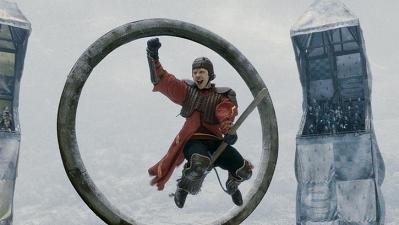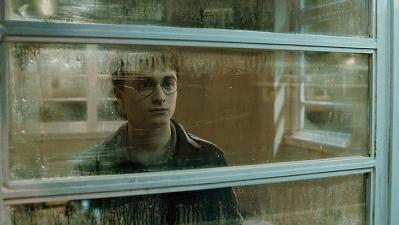So, John Nolte didn’t much care for the new “Harry Potter” movie. If memory serves, he didn’t care for movies 1-5, either. He admits, however, to never reading the books. This is a fatal error in appreciating the “Harry Potter” films, in my opinion.
John is like Charlie Brown and the football — forever doomed to dislike these movies, but he keeps coming back for more. Because the “Harry Potter” films are made for the books’ readers, period. In fact, you might say it’s a unique genre unto itself.
Let me attempt to head off the expected response to this: a movie should stand on its own, without requiring familiarity with the source material. Ordinarily, I agree with this. And I agree that the “Harry Potter” movies would probably be better off if they tried harder to satisfy this rule.
But it seems as though the filmmakers made a conscious or semi-conscious decision at some point early on to make these movies for the readership, not for the general public. They’re really cult films. And with such lavish budgets, if they were based on any other source material, they’d be a financial debacle.
But the “Harry Potter” series, as one of the biggest-selling of all time, is a very big cult indeed. And so, rather than drastically slash and retool the original stories, they tried to maintain fidelity to them, at the expense of comprehensibility for the non-readers in their audience.
Heck, I have trouble following the movies’ complex plotlines myself. And I’ve read all of the novels. I can’t imagine trying to grasp all those story threads without the benefit of the books.
For the most part, I just sit back and bask in the eye candy of the rich sets, costumes, locations, and special effects. As an unabashed Anglophile, I reveled in the magnificent British cast, glittering with such acting jewels as Maggie Smith, Michael Gambon, Helena Bonham Carter, Jim Broadbent, and David Thewlis. In particular, Alan Rickman’s delicious performance as the slithery Snape is alone worth the price of admission.
But I do agree with some of John’s criticisms. The movie is too long (what movie nowadays isn’t?) and probably tries to cram in too much detail from the novel. Of course, when adapting a 652-page book, you have to make many judicious cuts in what to transfer to the screen, but some of the choices seemed odd.
Some major plot points are quickly glossed over, while inconsequential events are dwelled on out of proportion to their significance. For example, they spend what feels like a quarter of an hour on Hagrid weeping over a dead giant tarantula, which has virtually no bearing on the story. But they leave out key elements of the ending, which renders the movie’s ending more emotionally flat than the book’s.
One more note on the film: While recent entries in the series have (understandably) taken a turn toward the dark, this latest contains some truly humorous moments, usually revolving around Ron’s and Harry’s romantic interests. Jessie Cave as the girl with a massive crush on Ron is especially amusing.
Now, on to another point about “Harry Potter” and culture in general:
Earlier this week Big Hollywood linked to an article on the Newsbusters site, which took note of an organization styling itself the Harry Potter Alliance. This group is trying to organize Harry Potter fans into an army of little left-wing grassroots activists.
Take a glance at some of the issues they address and it’s nearly indistinguishable from the Daily Kos: Darfur, Don’t Buy New Stuff, Fair Trade, Global Warming, LGBT, No New Stuff (it’s listed twice), Poverty, Rwanda, “WaldeMart,” etc.
I’m not entirely surprised by this development. What I was disappointed in, however, was the Newbusters correspondent’s reaction. Instead of critiquing the Alliance’s mostly boneheaded interpretations, he mocked the very idea of taking books and movies seriously.
“You know that some people have no lives when they take a movie and/or book and use it as a template for their lives,” he writes.
Instead of telling people to ignore the impact of popular culture (a quixotic effort if ever there was one), why not present an alternative view? In the case of “Harry Potter,” it’s a cinch to counter the HPA’s dubious lefty inferences with the ample conservative themes woven throughout the books.
For instance, I’ve always thought of the rise of Voldemort as a symbol for terrorism. And the way the media and bureaucracy in the “Harry Potter” books try to hush up or downplay the threat of Voldemort seems so reminiscent of our own feeble institutional responses to the rise of Islamist terror. It’s certainly a more apt analogy than the Harry Potter Alliance’s wan attempt to link global warming and commercialism with He-Who-Must-Not-Be-Named (and what does that remind you of?).
And any attempt to link “Harry Potter” with a critique of capitalism is just risible on its face. Is there a more robustly commercial enterprise than the Harry Potter machine? In the books themselves, there are numerous joyous references to the act of commerce. Ron Weasley’s twin brothers’ dream is to own their own shop, and one of the great pleasures detailed in the books is shopping for, yes, “new stuff” like wands, candy and Quidditch broomsticks.
As for the series’ underlying critique of conformity, one could just as easily argue that trying to indoctrinate kids into the prevailing leftist ethic is more conformist than conservatism, which is hardly the orthodoxy in the Age of Obama. For example, when even major broadcast networks such as NBC are hosting “green weeks,” how can anyone claim that concern for the environment is an edgy, unconventional stance?
I don’t mean to pick on Newsbusters, as a dismissive attitude toward pop culture prevails among most conservatives. But if conservatives truly want a place at the table again, they’ve got to take culture seriously. Winning elections isn’t enough. If the last nine years haven’t taught them that, nothing will.



COMMENTS
Please let us know if you're having issues with commenting.